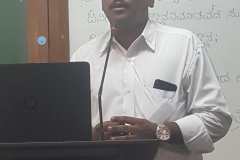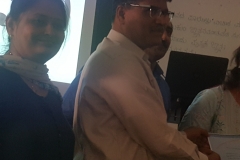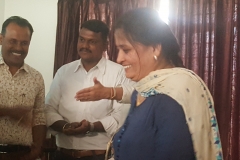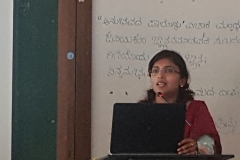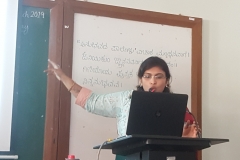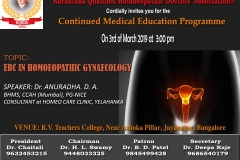The second CME of the year 2019, organised by KQHDA was held on 2nd March 2019 at RV Teachers college, Jayanagar at 3pm. The president of KQHDA, Dr Chaithali Kulkarni welcomed the audience followed by introduction of the speaker.
Speaker of the day was Dr Anuradha currently practicing in Yelahanka, Bangalore.
Dr Anuradha spoke about the topic “EBC IN HOMOEOPATHIC GYNAECOLOGY”. Audience were waiting eagerly to know what the term EBC stood for, and she surprised the audience by explaining that EBC stood for Evidence Based Cases in Homoeopathic Gynaecology.
The speaker’s motto was to emphasise that there is much evidence to prove that homeopathy is efficient in treating gynaecological cases.
Treating gynaecological problems include sound knowledge of physiology of female hormones mainly LH, FSH, Oestrogen and Progesterone who have promoting and inhibiting mechanisms in different aspects. Woman undergoes stress due to parental pressure in young age, marital, pregnancy, conception, childbirth, menopause. Hence while treating woman we can’t restrict only to genetalia instead treat her as an individual.
To approach gynaecological cases, we need to consider
1. Mind and Emotional symptoms (Anger, Resentments, Frustrations)
2. Inner feeling or core of the patient.
3. Stress will be relieved every month as menses for a woman.
4. Menses gets disturbed when hormones get disturbs and in turn mind gets disturbed.
5. Dysmenorrhoea comes when a lady is not accepting herself as a female.
6. Anger, resentment, jealousy, ego can cause uterine problems (fibroids, tumours, polyps).
7. Implementing male characteristics may cause Pcod, hirsutism, obesity.
8. Dyspareunia develops when a lady not accepting life partner.
The speaker presented a case of fibrocystic disease with multiple nodules on both the breasts who had tried hormonal treatment from many doctors and did not find hope in any. Based on the reportorial totality she was prescribed Phytolacca. The patient improved with the first sitting and gradually nodules dissolved, and breasts became totally normal in the following sessions.
Second case was a young lady suffering from PCOD and irregular cycles since menarche. She suffered from irregular cycles, loss of interest, dullness and weight gain. The speaker explained to the patient regarding the importance of mental symptoms and elicited strong mental symptoms during case taking. Based on the totality Nat mur 1M 3 doses were prescribed. The patient found much improvements in following sessions and after few months her USG was normal with the absence of ovarian cysts.
Third case was a case of infertility of a lady married for 8 years with a history of two ectopic pregnancies. Based on the totality Kali brom was prescribed. The result was seen immediate next month as the lady conceived. Currently the patient is having healthy pregnancy and undergoing 7th month of antenatal care with the speaker.
At the end of the session the speaker explained how simple and basic case taking in right manner can lead to such tremendous results in treating many gynaecological case.
Finally, the vote of thanks was given by Dr Chaithali and the momento was handed over by DR Swamy and Dr Sreenivasulu to Dr Anuradha. The pamphlets for One Day National seminar were released and distributed by KQHDA team.

